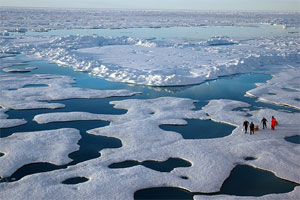Next year, the baton passes from Canada to the US as Chair of the Arctic Council, and with that change the focus shifts from resource extraction to climate change.
Amazingly, Secretary of State John Kerry says his top priorities will be addressing climate change, effective stewardship of the Arctic Ocean, and improved economic and living conditions for people living in Arctic villages.
What a difference! Canada’s goal has been "unprecedented industrial development" as the ice cap melts away exposing shipping lanes and opening the way for oil and mineral exploitation.
Instead, the US will use it as an opportunity to help nations reign in carbon and methane emissions that are melting the Arctic ice cap. Member and observer nations of the Arctic Council produce at least 60% of global black carbon emissions and over 40% of methane emissions, according to the Center for American Progress (CAP).
Read our article, Cutting Black Carbon Soot Could Save Arctic.

The ice cap is 40% smaller than it was in 1979. Some 90 billion barrels of oil are thought to lie underneath
– 13% of the world’s undiscovered oil reserves and 30% of gas reserves – and $1 trillion worth of minerals, such as zinc and nickel.
Chairmanship of the Arctic Council rotates every two years among eight nations: Canada, Denmark (which includes Greenland and the Faroe Islands), Finland, Iceland, Norway, Russia, Sweden, and the US.
Some items on the To Do list:
- improve data collection on the impact of climate change on the Arctic: more monitoring stations for carbon and methane; a digital elevation model of the Arctic that improves climate modeling and freshwater movement.
One goal is to develop "early warning system" that picks up on key changes in the Arctic’s physical, biological, social and economic terrain.
- promote information sharing between oil companies drilling in the region to help with oil spill preparedness and pollution control.
- work as a council to bring renewable energy to Arctic villages.
US Senior Arctic Official Julie Gourley presented these priorities at an Arctic Council meeting last week and apparently, they were endorsed by other members.
"These actions will cut black carbon and methane pollution; help Arctic communities adapt to the dramatic changes in their region; and protect natural areas, wildlife, and fisheries for future generations," says Carol Browner, now at CAP.
Admiral Robert Papp Jr., a special envoy to the Arctic, says the US will be "more active and more forward leaning" on addressing climate change impacts in the region, reports AllVoices.
"It is imperative to address the effects of climate change before it’s too late," and the US will tackle the challenge with the same tenacity that President Kennedy did to get a man on the moon.
Indeed, the melting Arctic was responsible for the "polar vortex" experienced by much of the Northern Hemisphere last winter and this summer and is predicted again for this year. Melting ice and more open water is causing unstable air currents and shifting the jet stream.
Meanwhile, Russia is moving ahead on its plans to drill at least 30 deep water wells there and the US has also approved oil exploration.
Frances Beinecke, former president of the Natural Resources Defense Council says:
"Imagine if Yellowstone National Park were suddenly thrown open to drilling or the waters of Acadia National Park became a thoroughfare for container ships. Americans would not let these treasures of our natural heritage become industrialized, because we have learned the value of setting aside wild and unique places.
We have a chance to apply those lessons in the Arctic, one of the wildest and most unique places on the planet. But we must move quickly, before polluting industries despoil the region’s marine ecosystems beyond repair. Although the White House strategy makes its drive for energy development clear it falls short on details for how to preserve fragile ecosystems".
Besides making climate change the central theme of US leadership, and reducing methane and black carbon emissions, CAP also recommended:
- All Arctic nations agree on a moratorium on commercial fishing
- Establish protected areas in the Arctic to protect its unique and climate-sensitive wildlife.
- Freeze US oil and gas drilling in the Arctic Ocean.
Read our article, Nations Confer About the Fate of the Arctic.
Here is the Coast Guard’s Arctic strategy:
